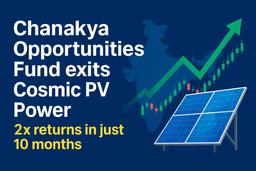Smartworks Coworking Spaces Limited has finalized a significant lease agreement for 1.66 lakh sq ft with Wolters Kluwer (India) Pvt. Ltd. at its Marisoft campus in Pune. This strategic move reinforces Smartworks' focus on large enterprise clients, which are now its primary revenue driver. The company also reported robust Q2 FY26 financial results, including a 21% year-on-year revenue increase and a 46% rise in normalized EBITDA, while achieving net-debt negative status.
Smartworks Coworking Spaces Limited has signed a substantial lease deal encompassing 1.66 lakh square feet with Wolters Kluwer (India) Pvt. Ltd. at its Marisoft campus located in Kalyani Nagar, Pune. This agreement is a key indicator of Smartworks' strategic pivot towards securing larger enterprise clients, which has become the most significant contributor to its revenue streams.
Wolters Kluwer (India) Pvt. Ltd., the Indian subsidiary of the Netherlands-headquartered global information, software, and professional solutions provider, will occupy a fully serviced managed workspace designed under Smartworks’ campus-led model. The Marisoft campus is situated in one of Pune’s established commercial hubs, benefiting from excellent connectivity, access to skilled talent, and comprehensive amenities.
For Smartworks, this deal underscores a fundamental shift in its revenue composition. The demand from clients requiring over 1,000 seats has surged, now accounting for approximately 35% of rental revenue, a substantial increase from about 12% three years ago. This trend is attributed to enterprises consolidating operations, seeking uniform workspace experiences across multiple cities, and preferring large-format, ready-to-use campuses over traditional lease structures.
Neetish Sarda, Founder and Managing Director of Smartworks, stated, “Our priority remains delivering unified, tech-enabled campuses that support large teams and multi-city expansion. Enterprises today need scale, speed and consistency, and our campuses are designed around these needs.”
The managed campus model has enhanced multi-city revenue stability for Smartworks, with over 30% of its rental revenue now generated from enterprises operating across various locations. This diversified revenue base mitigates reliance on the economic cycles of individual cities and improves long-term revenue visibility, a crucial metric in the flexible workspace sector.
This lease signing follows Smartworks' strong Q2 FY26 financial performance. The company reported revenues of ₹4,248 million, marking a 21% year-on-year growth, driven by increased occupancy, enterprise scaling, and expansion in key office markets. Normalized EBITDA saw a 46% year-on-year increase, supported by operational efficiencies and improved yields from large campuses, with an EBITDA margin of 16.4%. The firm also achieved a net-debt negative position, bolstered by operating cash flows of ₹614 million, indicating enhanced balance sheet strength.
With a portfolio spanning approximately 12.7 million sq ft across 14 cities and serving over 760 clients, including Global Capability Centers (GCCs), multinational corporations, and Indian enterprises, Smartworks is positioning itself as a long-term campus solutions partner for corporates seeking enterprise-grade, flexible workspace infrastructure.
Impact
This significant lease deal and the strong financial results are highly positive for Smartworks, likely enhancing investor confidence and potentially increasing its valuation. It validates the company's strategy of focusing on large enterprise clients and the effectiveness of its managed campus model. For the broader Indian commercial real estate and flexible workspace sector, this news signals sustained demand from large corporations for scalable, serviced office solutions, potentially attracting further investment and development in the segment.
Rating: 7/10
Definitions
Lease: A contract granting the right to use property for a specified period in exchange for rent.
Managed workspace: A flexible office solution where a third-party provider manages the space, services, and amenities.
Micro-markets: Specific, localized areas within a larger real estate market with distinct characteristics and demand/supply dynamics.
Campus-led model: A workspace strategy focused on developing large, integrated office campuses designed to accommodate significant numbers of employees and offer comprehensive facilities.
Plug-and-play campuses: Fully equipped office spaces that are ready for immediate occupancy and use, requiring minimal setup.
Rental revenue: Income generated by a company from leasing out its properties or assets.
Consolidating operations: The process of combining different business activities or functions into a single, more streamlined operation.
Revenue stability: The consistency and predictability of a company's income over time.
Revenue visibility: The degree to which a company's future revenue can be reliably forecast.
Flexible workspace sector: The industry that provides adaptable and short-term office solutions for businesses of various sizes.
Q2 FY26: The second quarter of the financial year 2025-2026, typically spanning July to September.
Year-on-year (YoY): A comparison of a company's performance metrics over a specific period against the same period in the previous year.
Normalized EBITDA: Earnings Before Interest, Taxes, Depreciation, and Amortization, adjusted to exclude non-recurring or unusual items, providing a clearer view of core operating performance.
Operating efficiencies: Improvements in business processes that lead to reduced waste, lower costs, and increased productivity.
Yield: The income return on an investment, often expressed as a percentage.
Net-debt negative: A financial state where a company's cash and cash equivalents exceed its total debt.
Operating cash flows: The cash generated from a company's normal business operations.
Balance sheet strength: The financial health and stability of a company, reflected in its assets, liabilities, and equity.
Portfolio: The total collection of assets or investments held by a company or individual.
GCCs (Global Capability Centers): Offshore business units of multinational corporations that provide services like IT, R&D, and customer support.
Multinationals: Large corporations that operate in multiple countries.
Enterprise-grade workspace infrastructure: High-quality, reliable, and scalable office facilities designed to meet the stringent requirements of large businesses.






